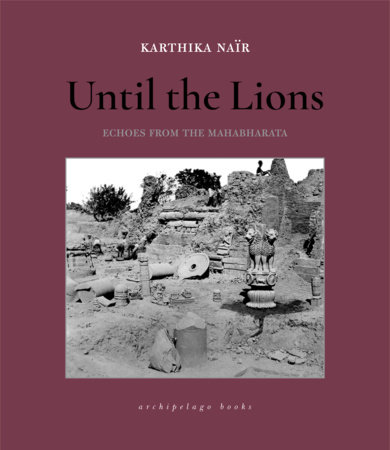Excerpt
Until the Lions
PADAT I
I. The Father
PAWN TALK: BRASS AND STRING
This is Kurukshetra, Son.
This is where our kings seek
to die – kings, princes, generals,
that whole heedless race of highborn
war-mongers – for a skyway,
swift and direct to heaven. Theirs, you
say, their heaven, not ours, it will still
be their heaven, as it is their earth,
their honour, both already theirs,
and with lives so slaked, heaven
their only conquest left.
But this is Kurukshetra,
this is where things could
change, Son. I heard the sages
swear: equal will all men be, in hell
or heaven, once killed here. Think, if
even the pariahs – Mahar and Shanar,
Chamar and Chandal, Dhobi, Bhangi,
they whose shades taint the land, so
the scholars also swear – can attain
casteless paradise, such an honour
once slain, perhaps our lives too
shall stand another chance
on so holy a strand
as Kurukshetra, sculpted
by Shiva’s own hand, then laid
east of Maru, rainless Maru, north
of wild Khandava, where Takshaka
rules his crafty tribe, south of gentle
Turghna yet westerly, not too far from
Parin. Dharmakshetra, they call her too,
this curl between two sacred rivers –
Saraswati and Dhrishtadvati – that
traverse the eight known worlds,
gleaning virtues – alongside all
the silt and loam and rubble –
from each one to disperse
on the divine hearse
that is Kurukshetra.
On these sands, they’d
abound: satya, daya, daan,
kshama, tapas, suchi …Truth,
Largesse, Purity, then – to uncurse
generations still to be sown – Mercy
and Kindness, Son, oh, and Celibacy,
Sacrifice, and some other merits I
can never name throng to make
this Vishnu’s ground, its godly
name his gift to an early,
devout Kuru king.
Look, on Kurukshetra,
night rises like another sun,
a younger, more brilliant one.
To the west stands the Pandava
camp: Yuddhishtira’s legions face
the break of each new dawn, theirs
the demand for war to attain peace
and justice, to retrieve his old realm,
the land he strewed with ease like
sand or dice, the subjects he cast
away in less than a trice. Crown
and honour should be his, our
elders persist, noble soul who
never lies, king with a single
vice: avid, unskilled player.
While Kurukshetra
can scarce contain the dark
constellation of Duryodhana’s
army: his men – a dazzle of fearless
glory – suffuse the East, from centre
to brim. Good, kind Duryodhana, our
Kuru sovereign, ours, Son, like few have
ever been. Duryodhana, eldest of the one
and hundred mighty Kaurava sons of that
purblind king Dhritarashtra. Duryodhana,
far-sighted like few rulers ever care to be,
reaping not one, nor a few but thirteen
harvests of peace, safety, prosperity
for all his people, even those of us
that survive like vermin
on outer rims.




